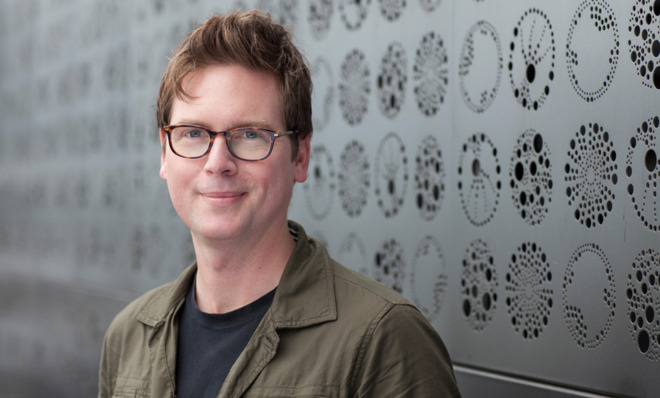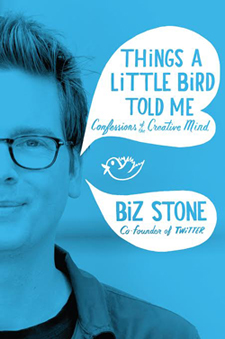'Being nice never hurts': An interview with Twitter co-founder Biz Stone
Stone reflects on his turbulent time at the micro-blogging service, while dishing on his new project, Jelly

A free daily email with the biggest news stories of the day – and the best features from TheWeek.com
You are now subscribed
Your newsletter sign-up was successful
It takes moxie to apply for a job at Google without a college degree. And when asked about that degree by a human resources rep, it takes more than moxie to respond that you've seen an ad on TV for where to get one.
But you should expect nothing less from Twitter co-founder Biz Stone, author of the new book Things a Little Bird Told Me, which encompasses his stint at Google, the launch of a certain micro-blogging service, and more. The anecdote is reflective of his particular brand of cheekiness, which is also seen in the book's publication date of April Fool's Day — only fitting for a jokester who once dressed up as a nutty professor to promote his company.
A recent headline in the Financial Times dubbed him "Twitter's Mister Nice Guy," and Stone is indeed inclined to highlight his G-rated side, including the fact that one of his favorite movies is The Princess Bride. ("Inconceivable!" he exclaimed in an interview with The Week, repeating one of the movie's more memorable catchphrases.) His book is a blend of his smiley-face personality and his insights on the interplay between creativity and the business world.
The Week
Escape your echo chamber. Get the facts behind the news, plus analysis from multiple perspectives.

Sign up for The Week's Free Newsletters
From our morning news briefing to a weekly Good News Newsletter, get the best of The Week delivered directly to your inbox.
From our morning news briefing to a weekly Good News Newsletter, get the best of The Week delivered directly to your inbox.
"Being nice never hurts," he told The Week, clearly unashamed of the "nice guy" tag. "It sounds strange. I decided when I was a young kid that I would just be nice. Weird thing, I just said I'm going to be nice and see what happens. And so many awesome things started happening, and that grew into a philosophy — into the idea of not taking credit where it's not deserved."

That ethos can be found in the six principles he drafted for Twitter, which include the following: "There are more smart people out there than in here," and "We will win if we do the right thing for our users." It's also seen in his insistence that the service be a vehicle for political change, while not coming down on one side or the other (as he relates in his book, this was why he was frustrated when fellow Twitter co-founder Jack Dorsey moderated a town hall with President Obama in 2011).
Elsewhere, Stone writes that the turbulence at Twitter — musical chairs in the corner office, the fail whale, and the internal brawling depicted later in Nick Bilton's Hatching Twitter, to name a few of the more famous episodes — were "the reality of what happens when a startup is successful."
"Relationships were destroyed," Stone writes. "It was a trying time. During those turbulent days, I remember sitting in a board meeting and thinking to myself, 'Why is this happening?' And then the answer dawned on me. Oh. Because billions of dollars are now involved."
A free daily email with the biggest news stories of the day – and the best features from TheWeek.com
Meanwhile, along with Twitter's rise as a media and tech juggernaut, it's become commonplace for observers to note the mainstream public's befuddlement at the service's jargon and idiosyncrasies. Stone, who left Twitter in 2011 and whose new company, Jelly, launched three months ago, doesn't dispute that characterization. He said that Twitter is still "basically just getting started."
"I believe Twitter is going to be a timeless company with enduring value, and to get to that point is a long and bumpy road," he said. "There's a lot of work ahead of them, for sure."
He'll be facing similar challenges himself, as he tries to familiarize people with Jelly. In essence, Jelly can be thought of as a kind of social search engine. When a query is entered, the user will get "brand-new answers coming back to you written by trusted people" like friends and contacts, Stone explained. And immediately before talking to The Week, Stone published a blog post on the Jelly website outlining expanded features like map integration.
"It's been 15 years since anyone has completely reimagined the way we get answers to our questions," Stone said. "We're all connected, we're all using smartphones. Jelly is trying to take a fresh look at how we get answers today. It's designed as a better way to ask a question and a better way to get answers."
One of the themes of Things a Little Bird Told Me is Stone's belief that "we have become the most hyperconnected humanity that's ever existed on Earth" not for keeping tabs on family and friends, sharing a stream of status updates, or following world events in real time. The true promise of a connected society, he writes, is "people helping one another."
After thinking for a moment, he says that's also how he would like to be remembered.
"I hope that people will remember me as being a very helpful person," he said. "That's something I want to dedicate my life to. The idea of empathizing with others. And hopefully [I can] lead by example, and get everyone else thinking of other people and thinking of ways to help them."
-
 Minnesota's legal system buckles under Trump's ICE surge
Minnesota's legal system buckles under Trump's ICE surgeIN THE SPOTLIGHT Mass arrests and chaotic administration have pushed Twin Cities courts to the brink as lawyers and judges alike struggle to keep pace with ICE’s activity
-
 Big-time money squabbles: the conflict over California’s proposed billionaire tax
Big-time money squabbles: the conflict over California’s proposed billionaire taxTalking Points Californians worth more than $1.1 billion would pay a one-time 5% tax
-
 ‘The West needs people’
‘The West needs people’Instant Opinion Opinion, comment and editorials of the day